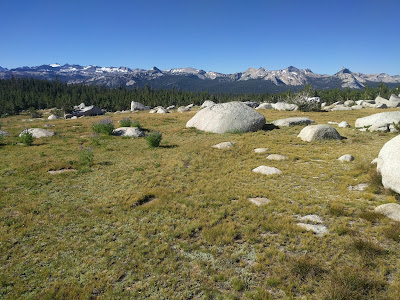"Happy the showers that fall on so fair a wilderness, scarce a drop can fail to find a beautiful spot — on the tops of the peaks, on the shining glacier pavements, on the great smooth domes, on forests and gardens and brushy moraines, plashing, glinting, parrering, laving."
 |
| Tenaya Canyon, from the top of Half Dome |
I just finished reading My First Summer in the Sierra by John Muir and there were so many fun passages in the book that reminded me of my trips to the Sierras! As you may or may not know, John Muir was a Scottish-American naturalist, author, environmental philosopher, glaciologist and early advocate for the preservation of wilderness in the United States (Wikipedia). He was born in 1838 and this book took place from June to September of 1869.
The book is in journal form and chronicles the trip that he took with a sheepherder, who had to move his 2,000 plus sheep to higher pastures once the grasses in the valleys were dried out. They move up in elevation from the Central Valley of California, which sits near sea level, towards the high point of Tuolumne meadows in what is now Yosemite (approximately 10,000 ft), arriving in August and then turning back down the hill in September before snow starts flying again.
If you like trees and plants, you will love this book. If you don't, you can skip over his description of the abies magnifica (silver tipped fir) and go right to parts such as this one:
"Early in the morning I tied my notebook and some bread to my belt, and strode away full of eager hope, feeling that I was going to have a glorious revel."
 |
| The John Muir Trail, between Lake Tenaya and Cathedral Lakes |
I mean, who can say no to a glorious revel? He also talks a lot about the weather, but in a way that makes weather anything but a dull subject.
"Another one of those charming exhilarating days that make the blood dance and excite nerve currents that render one un-weariable and well-nigh immortal."
“Warm, sunny day, thrilling plant and animals and rocks alike, making sap and blood flow fast, and making every particle of the crystal mountains throb and swirl and dance in glad accord like star-dust.”
 |
| Near Tuolumne Meadows -- all these boulders were left behind by the glacier. |
Be still my beating heart. Doesn't he make a sunny day sound absolutely fabulous? Then he passes by Lake Tenaya and notes the existence of:
"a knob or knot of burnished granite, perhaps about a thousand feet high, apparently as flawless and strong in structure as a waveworn pebble, and probably owes its existence to the superior resistance it offered to the section of the overflowing ice-flood."
 |
| Lake Tenaya (and the knot of burnished granite, perhaps) |
I think I found the knot! If not, I better go and look again soon! He gets to Tuolumne meadows, and remarks:
"No Sierra landscape that I have seen holds anything truly dead or dull, or any trace of what in manufactories is called rubbish or waste; everything is perfectly clean and pure and full of divine lessons."
 |
| Tuolumne Meadows (with Cathedral peak in the background) |
I agree wholeheartedly. Every time I have gone to the Sierras, around every corner is a new wonderment, another photo to snap, or smell in the air, or a new bird sound. It really is quite fabulous and this book really hit home. There were a few interesting things such as when he describes one day that he went from the North Dome to the Valley floor, which must be about a 10 or 12 mile hike down a steep trail nowadays. But then, there was no trail, and he described bushwhacking down a ravine, which must have been difficult (plus I think there is about a 3,000 or 4,000 ft drop in elevation to boot)!
I also love how he just straps a loaf of bread to his belt, as quoted above, or lays down on pine boughs or even a rock one night, so that he could listen to the sound of a waterfall nearby. It's just so poetic and it seems like such a grand adventure. I wonder if it really was as lovely as he makes it sound. He does note that there are large mosquitoes, some about an inch from tip of the stinger to the end of the wings, which sounds like something I would not be as fond of!!
There are many, many more passages that I bookmarked, noted and saved, but I will end my barrage of quotes with this one, which really reminded me of why I like to hike and do trail runs, especially in the Sierras!
 |
| Cathedral Peak and one of the Cathedral lakes |
"Towards sunset, enjoyed a fine run to camp, down the long south slopes, across ridge and ravines, gardens and avalance gaps, through the firs and chaparral, enjoying wild excitement and excess of strength, and so ends a day that will never end."
Have you ever been to the Sierra Nevadas? If so, where did you go? Did you love them as much as Mr. Muir and I do?





















Follow Us
Were this world an endless plain, and by sailing eastward we could for ever reach new distances